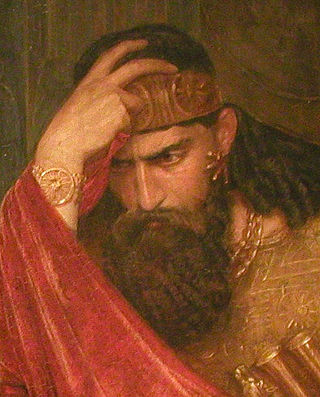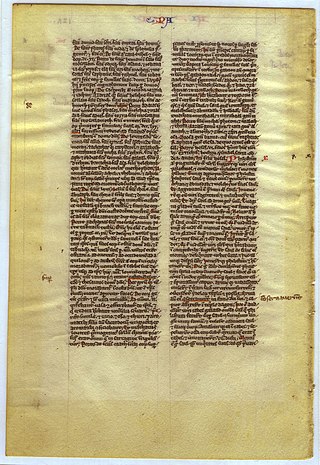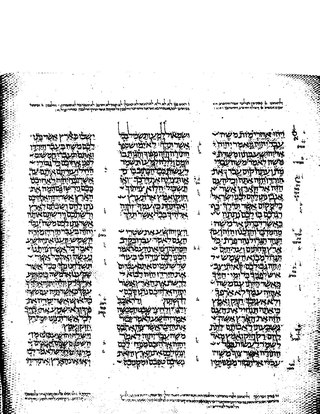Related Research Articles

The Book of Samuel is a book in the Hebrew Bible, found as two books in the Old Testament. The book is part of the Deuteronomistic history, a series of books that constitute a theological history of the Israelites and that aim to explain God's law for Israel under the guidance of the prophets.

Saul was a monarch of ancient Israel and Judah and the first king of the United Monarchy, according to the Hebrew Bible and Old Testament. His reign, traditionally placed in the late eleventh century BCE, supposedly marked the transition of the Israelites from a scattered tribal society ruled by various judges to organized statehood.

Rizpah was the daughter of Aiah, and one of Saul's concubines. She was the mother of Armoni and Mephibosheth.

Gibeon was a Canaanite and later an Israelite city, which was located north of Jerusalem. According to Joshua 11:19, the pre-Israelite-conquest inhabitants, the Gibeonites, were Hivites; according to 2 Samuel 21:2, they were Amorites. The remains of Gibeon are located in the southern portion of the Palestinian village of al-Jib in the occupied West Bank area called Area C

Ish-bosheth, also called Eshbaal was, according to the Hebrew Bible, the second monarch of the Kingdom of Israel. After the death of his father, Saul, Ish-bosheth ascended to the throne and reigned for two years.
Jabesh-Gilead, sometimes shortened to Jabesh, was an ancient Israelite town in Gilead, in northwest Jordan. Jabesh is mentioned several times in the Hebrew Bible primarily in connection with King Saul's battles against the Ammonites and Philistines.

David and Jonathan were, according to the Hebrew Bible's Books of Samuel, heroic figures of the Kingdom of Israel, who formed a covenant, taking a mutual oath.
Kish was the father of the first king of the Israelites, Saul.

Armoni and Mephibosheth are named in the Hebrew Bible as the two sons of Saul by his concubine Rizpah, daughter of Aiah. After Saul's death, they were killed in revenge for his violence against the Gibeonites.

Zelah is a village in Cornwall, England, United Kingdom, approximately 5 miles north of Truro. Zelah is the largest settlement in the civil parish of St Allen. The parish population in the 2001 census was 435.

Jonathan is a figure in the Book of Samuel of the Hebrew Bible. In the biblical narrative, he is the eldest son of King Saul of the Kingdom of Israel, and a close friend of David. He is described as having great strength and swiftness and excelling in archery and slinging.

2 Samuel 21 is the twenty-first chapter of the Second Book of Samuel in the Old Testament of the Christian Bible or the second part of Books of Samuel in the Hebrew Bible. According to Jewish tradition the book was attributed to the prophet Samuel, with additions by the prophets Gad and Nathan, but modern scholars view it as a composition of a number of independent texts of various ages from c. 630–540 BCE. This chapter contains the account of David's reign in Jerusalem. This is within a section comprising 2 Samuel 21–24 containing the appendices to the Books of Samuel.

1 Chronicles 8 is the eighth chapter of the Books of Chronicles in the Hebrew Bible or the First Book of Chronicles in the Old Testament of the Christian Bible. The book is compiled from older sources by an unknown person or group, designated by modern scholars as "the Chronicler", and had the final shape established in late fifth or fourth century BCE. This chapter focuses on the tribe of Benjamin, especially the family of King Saul. It belongs to the section focusing on the list of genealogies from Adam to the lists of the people returning from exile in Babylon.

1 Chronicles 12 is the twelfth chapter of the Books of Chronicles in the Hebrew Bible or the First Book of Chronicles in the Old Testament of the Christian Bible. The book is compiled from older sources by an unknown person or group, designated by modern scholars as "the Chronicler", and had the final shape established in late fifth or fourth century BCE. This chapter contains the list of people who joined David: before his coronation and after he was made king in Hebron. The whole chapter belongs to the section focusing on the kingship of David.

1 Samuel 9 is the ninth chapter of the First Book of Samuel in the Old Testament of the Christian Bible or the first part of the Books of Samuel in the Hebrew Bible. According to Jewish tradition the book was attributed to the prophet Samuel, with additions by the prophets Gad and Nathan, but modern scholars view it as a composition of a number of independent texts of various ages from c. 630–540 BCE. This chapter describes the meeting between Saul and Samuel which led to Saul's first anointing as king, within a section comprising 1 Samuel 7–15 which records the rise of the monarchy in Israel and the account of the first years of King Saul.

1 Samuel 13 is the thirteenth chapter of the First Book of Samuel in the Old Testament of the Christian Bible or the first part of the Books of Samuel in the Hebrew Bible. According to Jewish tradition the book was attributed to the prophet Samuel, with additions by the prophets Gad and Nathan, but modern scholars view it as a composition of a number of independent texts of various ages from c. 630–540 BCE. This chapter contains Saul's act of disobedience after his coronation. This is within a section comprising 1 Samuel 7–15 which records the rise of the monarchy in Israel and the account of the first years of King Saul.

2 Samuel 4 is the fourth chapter of the Second Book of Samuel in the Old Testament of the Christian Bible or the second part of Books of Samuel in the Hebrew Bible. According to Jewish tradition the book was attributed to the prophet Samuel, with additions by the prophets Gad and Nathan, but modern scholars view it as a composition of a number of independent texts of various ages from c. 630–540 BCE. This chapter contains the account of David's reign in Hebron. This is within a section comprising 1 Samuel 16 to 2 Samuel 5 which records the rise of David as the king of Israel, and a section comprising 2 Samuel 2–8 which deals with the period when David set up his kingdom.

2 Samuel 9 is the ninth chapter of the Second Book of Samuel in the Old Testament of the Christian Bible or the second part of Books of Samuel in the Hebrew Bible. According to Jewish tradition the book was attributed to the prophet Samuel, with additions by the prophets Gad and Nathan, but modern scholars view it as a composition of a number of independent texts of various ages from c. 630–540 BCE. This chapter contains the account of David's reign in Jerusalem. This is within a section comprising 2 Samuel 9–20 and continued to 1 Kings 1–2 which deal with the power struggles among David's sons to succeed David's throne until 'the kingdom was established in the hand of Solomon'.

Joshua 9 is the ninth chapter of the Book of Joshua in the Hebrew Bible or in the Old Testament of the Christian Bible. According to Jewish tradition the book was attributed to Joshua, with additions by the high priests Eleazar and Phinehas, but modern scholars view it as part of the Deuteronomistic History, which spans the books of Deuteronomy to 2 Kings, attributed to nationalistic and devotedly Yahwistic writers during the time of the reformer Judean king Josiah in 7th century BC. This chapter focuses on the deception by the people of Gibeon to avoid annihilation by having a treaty with the people of Israel under the leadership of Joshua, a part of a section comprising Joshua 5:13–12:24 about the conquest of Canaan.
References
- ↑ "Zela (Haeleph)". BibleAtlas.
- Wordsworth Encyclopedia of World Religions. Ware, Hertfordshire: Wordsworth Editions. 1999. ISBN 978-1-84022-029-2. (Entered under Zelach: quoting Joshua 18:21 and 2 Samuel 21:14)